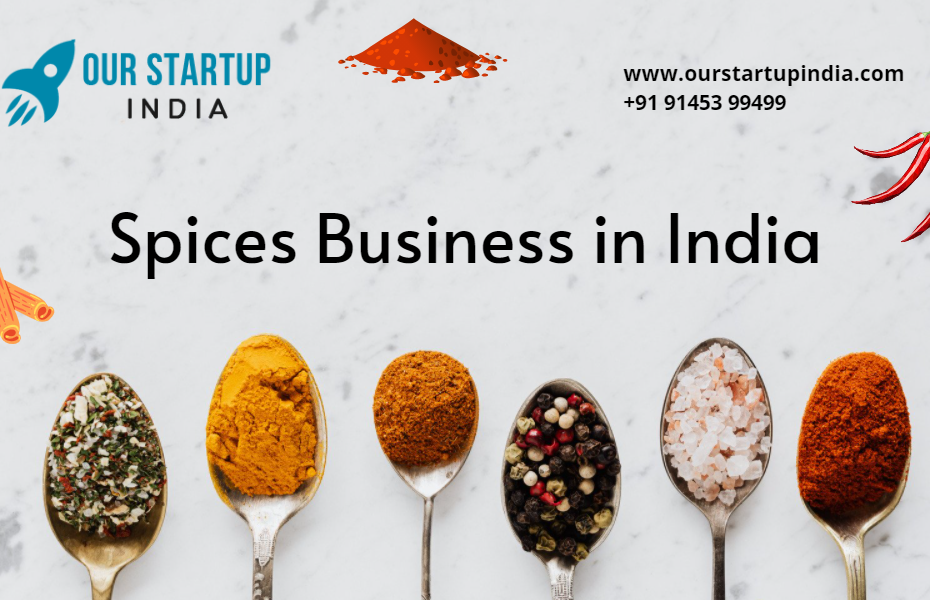Spices business
India as we know it is a major producer and exporter of spices. Moreover, it is recognized as a lucrative business in India. Any individual can start a small, medium, and large-scale spices business according to his investment potential.
Spice powder is an essential ingredient in cooking, no Indian food is made without spices, every food industry uses spices in this article; We discuss the steps to start a spice business in India with relevant information.
Spices Business Market Opportunity in India
India produces all known spices. The country is the largest exporter of these products. Spice is a mass-consumed product that is often used in cooking or seasoning food, and its internal demand is increasing very steadily.
The use of powdered spices has increased with different lifestyles and especially with changes in eating habits and increasing income levels. Also, starting a spices business in India requires various certifications or licenses.
Is Spices Business in India Profitable?
As far as we know the spice appears under the basic ingredients category. Also, it is an important food item for kitchens. In a country like India where population density is high, consumption is also very high.
Spice blends and branded spices require higher profits compared to straight and unbranded spices. We can also start a small-scale home-based spices business as a lucrative investment opportunity for new entrepreneurs in India.
Registration & License for Spice Business in India
Whether you are starting a small or large-scale spice business, you need to get these records and licenses.
Company Registration:
To start a spice business in India, first, get a corporate link or the company must be established in a practical way with an attractive name and logo.
GST Registration:
GST registration helps to recognize your business and opens up many opportunities for your business. It is therefore mandatory for every business to register for GST.
Trade License:
A business license is a document/certificate that allows an applicant to start a specific business or business in a specific area. It is therefore necessary to obtain a trade license from the local authorities.
Udyam/MSME Registration:
Register your business through Udyam Registration / MSME Registration which will help you to avail the facility and grant from the State Government.
Trademark Registration:
It has become very important to protect your brand logo from being misused or copied by others. So to secure your brand you need to apply for a trademark and get the trademark registration number.
FSSAI Registration:
Spice powder is a food item, so you must obtain a food processing license or FSSAI registration for each food industry.
Required IEC code:
The IEC is the first registration required for businesses importing or exporting goods and services from India. It is therefore necessary to apply for the IEC code.
BIS certification:
You must apply for BIS certification, which has ISI specifications for ground spices
- Blackhole and Ground ISI-1798-1961
- Chili Powder ISI-2445-1963
- Coriander Powder ISI-2444-1963
- Curry leaves ISI-1909-1961
- Spices and Condiment ISI-1997-1961 Samples and Test Methods
- Yellow powder ISI-2446-1963
ISO Certification:
ISO 9001 company’s products and services meet customer expectations and excellent customer satisfaction. It is therefore essential for a business to obtain ISO certification.
The production process of the spice business in India
1. Cleaning process
It is a primary process for making spice products that are not manually cleaned by hand by removing impurities such as stone, dust, and dirt.
2. Drying Process
After cleaning, place them in the sun so that they dry, the quality of the spice powder depends on the well-dried spice.
3. The frying process
Once the spices are dry, they work through the frying process, which is important for frying the spices because it helps to give the aroma, color, and good taste to the spice powder.
4. Grinding process
The grinding machine is used to convert spices into powder form.
5. Standardization process
Standardization is the basis of the composition and dimension of spices, which are mixed with the ingredients used, depending on the type (flavor), size, shape, density, and color of the spice.
6. Sieving Process
Make sure the spice powder has a uniform mesh dimension.
7. Spice packaging
Spice packaging is a must to protect and preserve your spices, and packaging bags like these will give you the flexibility to choose the best size, style, and features for your spices.
Raw Material Required in Spice Business
The basic and most essential ingredient ingredients to incorporate your spice business; Groundless spice. You can start by purchasing the following items in bulk;
- Chilly
- Coriander
- Corrugated cartons
- Cumin
- Fennel seeds
- Methi leaves
- Mustard
- Pepper
- Turmeric
Machinery used in Spice Business
The following is a list of some of the devices you may need;
- Grinding machine
- Vulnerability pulverizer
- Dual-level pulverizer
- In Hammer
- Spice plant
- Pounding machine
Commence Exporting Spices
We know that India is the largest exporter of spices. Ingredients include cumin, red chili, pepper, turmeric, green cardamom, etc., and there is a high demand for Indian spices abroad, so if you decide to start a spice business you should consider export potential. Here is the list of spices mentioned in the Spice Board Act.
Where to Sell Spices
Once you have made your product, now you need to sell it to make a profit. This is the final step, but the most important step; Here is the list –
- Local Market Retail
- Wholesale
- Online portal
- Export
So, these are the procedures for starting a spice business in India.
